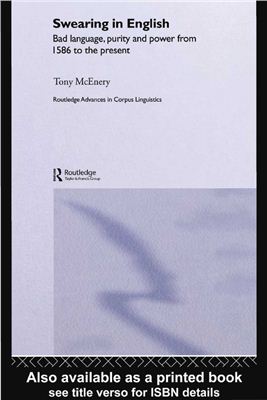Английское сквернословие.
Routledge,
2006. 263 p.
This book is dedicated to those who struggle to have their views heard.
"Swearing in English" uses the spoken section of the British National Corpus to establish how swearing is used, and to explore the associations between bad language and gender, social class and age. The book goes on to consider why bad language is a major locus of variation in English and investigates the historical origins of mode attitudes to bad language.
Drawing on a variety of methodologies, including historical research and corpus linguistics, Tony McEnery takes a sociohistorical approach to discourses about bad language in English, aiming to reflect the diversity of approaches to the subject, and thus to provide a forum for debate and detailed discussion of the various ways of building, exploiting and theorising about the use of corpora in language studies.
Contents:
List of figures.
List of tables.
Acknowledgements.
Bad language, bad manners.
How Brits swear.
So you recorded swearing: bad language in present-day English.
Censors, zealots and four-letter assaults on authority.
Early mode censorship of bad language.
Mode attitudes to bad language form: the reformation of manners.
Late-twentieth-century bad language: the moral majority and four-letter assaults on authority.
Discourses of panic.
Sea change: the Society for the Reformation of Manners and moral panics about bad language.
Mutations: the National Viewers’ and Listeners’ Association moral panic.
Postscript.
Notes.
Bibliography.
Index.
Routledge,
2006. 263 p.
This book is dedicated to those who struggle to have their views heard.
"Swearing in English" uses the spoken section of the British National Corpus to establish how swearing is used, and to explore the associations between bad language and gender, social class and age. The book goes on to consider why bad language is a major locus of variation in English and investigates the historical origins of mode attitudes to bad language.
Drawing on a variety of methodologies, including historical research and corpus linguistics, Tony McEnery takes a sociohistorical approach to discourses about bad language in English, aiming to reflect the diversity of approaches to the subject, and thus to provide a forum for debate and detailed discussion of the various ways of building, exploiting and theorising about the use of corpora in language studies.
Contents:
List of figures.
List of tables.
Acknowledgements.
Bad language, bad manners.
How Brits swear.
So you recorded swearing: bad language in present-day English.
Censors, zealots and four-letter assaults on authority.
Early mode censorship of bad language.
Mode attitudes to bad language form: the reformation of manners.
Late-twentieth-century bad language: the moral majority and four-letter assaults on authority.
Discourses of panic.
Sea change: the Society for the Reformation of Manners and moral panics about bad language.
Mutations: the National Viewers’ and Listeners’ Association moral panic.
Postscript.
Notes.
Bibliography.
Index.

